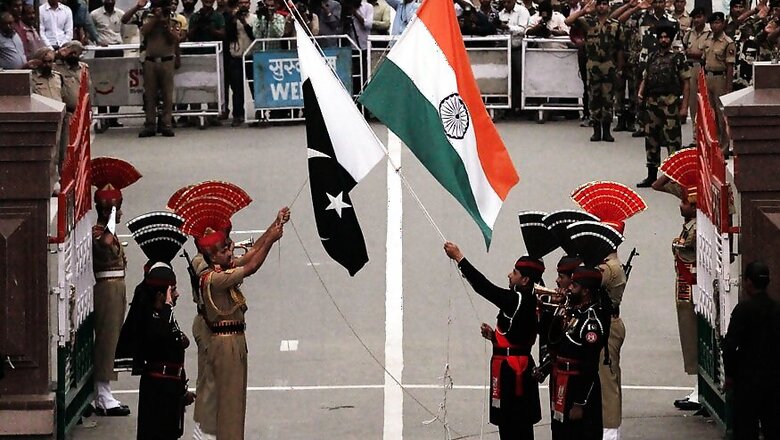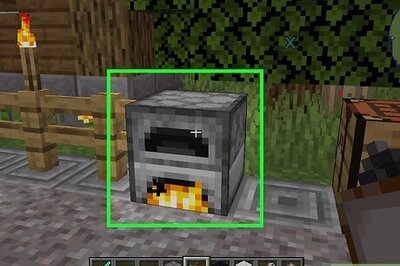
views
October in London this year has been quite eventful. Sometimes one does not get any food for thought, however, October is yet to be over and we have had two conferences and more importantly a “public debate” between two former spooks of India and Pakistan.
It was followed by a discussion made lively by former RAW (Research and Analysis Wing) chief Amarjit Singh Daulat with his stern looking counterpart. Difference between the two was that Daulat spoke extempore while former ISI (Inter-services Intelligence) DG Ehsanul Haq did a bit of ranting from a long paper. Overall much of hypocrisy and less of diplomacy seemed to the narrative of the day.
The former intelligence chiefs stressed the need for resumption of dialogue between the two countries in the larger national interests of their poverty-ridden people. It is much of the same cliché that one has grown old hearing. It is a story of talking in miles and moving in centimetres.
Squeezed in a Savile Row-like suit, one size smaller, General Ehsanul Haq perhaps did right —to avoid later misquotes and controversies — read out his case from a long paper that must have been compiled by the so-called experts in his previous Intelligence Directorate as such it was studded with lot of historic data, much of it even parrots know. The very fact that Daulat did not have a paper to counter Gen Ehsan
showed that he had the subject on his fingertips.
Even intelligent roadside urchins in the streets of Delhi and Lahore would agree that war is a bad thing and no more an option between the two nuclear powers. Together they will say let’s play cricket and let’s have more of it and there would be greater atmosphere of “bhai-chara”, while the former spooks said leadership of both the countries should move meaningfully toward speaking to each other at all levels and end communications boycott.
Villain of the piece as both the agencies are in keeping the kettle on the boil, they did a great deal in academically outlining the intelligence perspectives of their countries, answered questions of the audience and shared jokes with each other.
Whatever transpired between the two spies in that “public debate”, tete-à-tete in private must have been more interesting — in a pub — as reported by the social media. No doubt, a glass too many makes conversation interesting but takes away the real performance as Shakespeare would have put it.
General Ehsan’s argument that “interaction must be such that even when there is a breakdown in diplomatic relations between states and entities, the intelligence channel must continue because that becomes the last resort for venting and pre-empting crisis, the initiative for this has to come from the political level down” makes sense.
According to Daulat, intelligence sharing between India and Pakistan once even saved the life of President General Pervez Musharraf. Must have since Ehsan did not rebut his claim. Was it a favour or otherwise—only history will tell?
Indeed, Gen Ehsan’s is a very interesting observation. However, I tend to disagree. Politicians—if given a free hand by their defence establishments could resolve issues and reach solutions much easier and quicker. I would not like here to say that besides war as Churchill said, even negotiations in matters of disputes should not be left into the hands of non-civilians.
Remember how the then President Zulfikar Ali Bhutto, leader of a vanquished nation, negotiated a fair deal in Shimla in 1972 on the basis of mutual respect with the leader of a victorious nation — Prime Minister Indira Gandhi.
He retrieved on the conference table over 12,000 kilometres of Pakistan’s precious territory lost to India on a battlefield while half of the country had already been surrendered by General Yahya Khan & Company. To get 93,000 PoWs, including personnel of the armed forces, released was yet another feat of masterly diplomacy, statesmanship in negotiations and statecraft based on mutual trust.
Similarly, in 1989, Benazir Bhutto negotiated with Rajiv Gandhi the demilitarisation of Siachen Glacier—world’s highest battleground—where according to General Zia-ul-Haq not a blade of grass grew, nor its snow was fit for human consumption.
Had it been materialised then both the countries would have been saving Rs 20 crore per day that they spend on maintaining their troops in most difficult and crippling weather conditions. More soldiers die—on both sides — of lethal frostbite than by the bullets exchanged in cross firing.
On his return Rajiv Gandhi’s political fortunes changed, his defence establishment ruled it out and the deal was off, while in Pakistan intelligence apparatus planted a story that Interior Minister Aitezaz Ahsan provided a list of Sikh freedom fighters to the Indians. It was used in media for the character assassination of Prime Minister Benazir Bhutto and Aitezaz as security risks.
However, just before he was summoned by the Lord above, retired DG ISI Gen Hameed Gul confessed in a TV interview that there was no list of Sikh freedom fighters given to the Indians. It was a dirty ploy to put Benazir Bhutto on the defensive.
Even before 1972, there was an agreement reached between Liaquat Ali Khan and Jawahar Lal Nehru to negotiate LoC as final border with some adjustments without prejudice to the United Nations resolutions. It could not see light of the day due to Liaquat’s assassination in 1951.
It is said that it was much similar to the one offered by General Pervez Musharraf in his four-point formula with the exception that Pakistani president went a step further in his offer by abandoning Pakistan’s principled position on the UN Resolutions for the right of self-determination for the people of Kashmir.
Political leaders can do much better in negotiations. They generate the trust factor that is needed for kick start for negotiations. Bhutto and Mrs Gandhi did that at Shimla in 1972. We owe over 45 years of sub-continental peace to Shimla agreement. Benazir Bhutto and Rajiv Ghani almost resolved the Siachen issue.
Even Nawaz Sharif and Atal Bihari Vajpaee achieved a breakthrough in the deadlock only to be subverted by General Pervez Musharraf’s Kargil’s pyrrhic misadventure, only saved of a catastrophe by US President Bill Clinton in 1999.
In 2008, with the return of the civilian government President Zardari wanted to move forward from stalemate to proactive diplomacy, Mumbai happened. Nawaz Sharif went head over heels to get talks going and it seemed things would move in the right direction when Prime Narendra Modi visited him unscheduled in Raiwind. Pathankot happened and everything was derailed.
Instead of having “public debate” top spooks in the two countries and other saner elements—if they have any say — should advise their governments to agree to immediate demilitarisation of Siachen Glacier, followed by gradual demilitarisation of the occupied territories and resume dialogue if not on any other proposal, revisit General Pervez Musharraf’s four-point formula or Nawaz-Vajpayee Lahore Declaration of February 1999.
A peaceful resolution of Kashmir dispute now could serve as the greatest harbinger of peace in the region for over 1.5 billion people to travel far in the realm of successes and prosperity in an atmosphere of peaceful co-existence.
(The author is former High Commissioner of Pakistan to UK, Advisor to Prime Minister Benazir Bhutto and a veteran journalist)


















Comments
0 comment